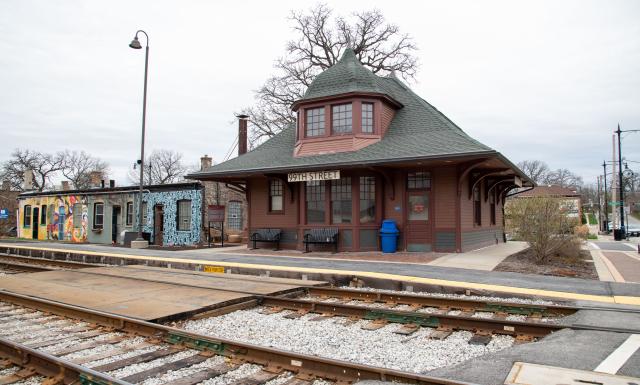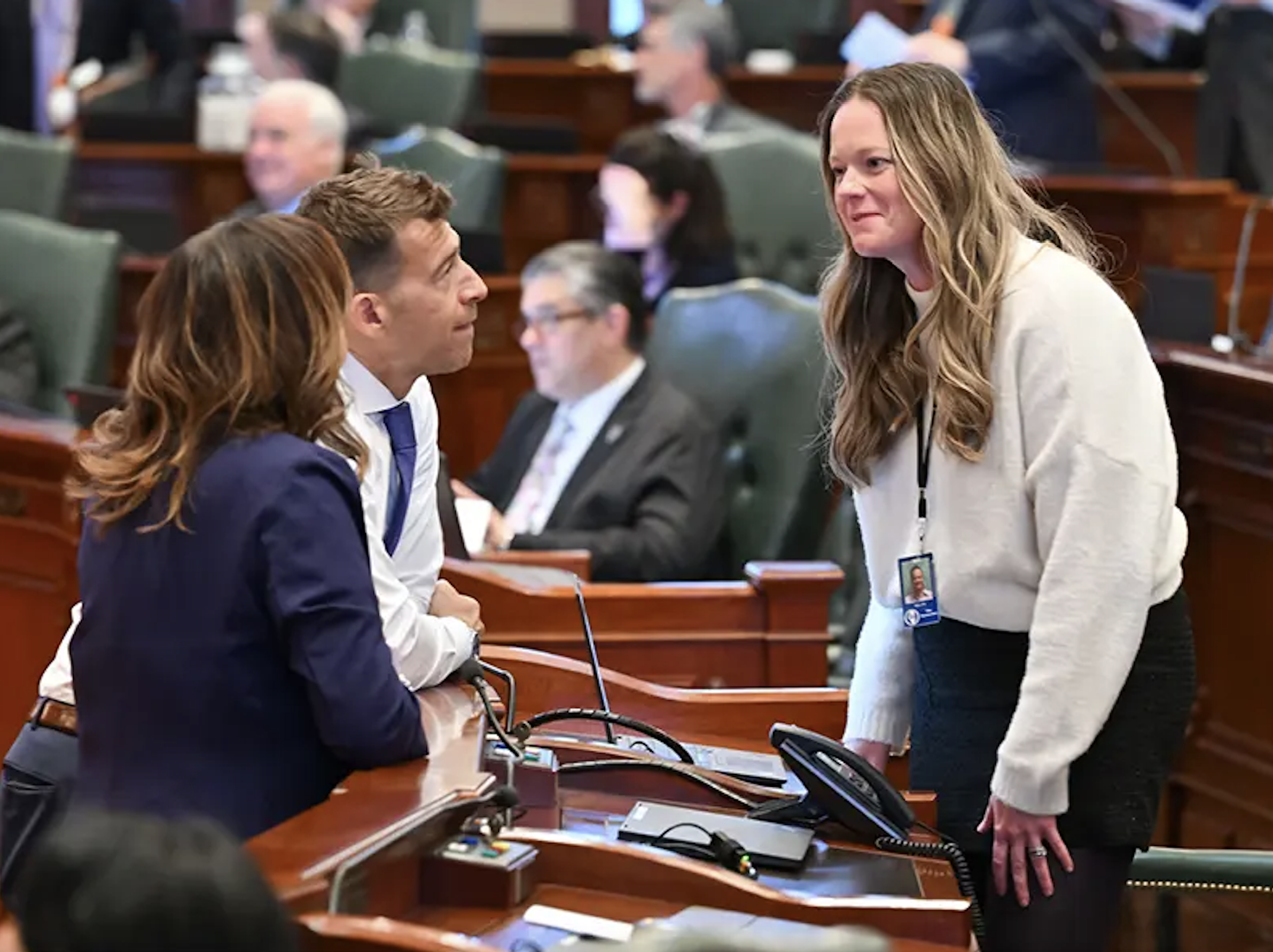
As Streetsblog Chicago readers are well aware, this is a pivotal month for regional sustainable transportation. State legislators will return to Springfield for a fall veto session, taking place on October 14-16 and October 28-30. While things are tense right now in Illinois, hopefully the lawmakers won't be distracted from passing a transit funding/reform bill, to permanently save Chicagoland from projected 40 percent transit service cuts and 3,000 layoffs.
The Regional Transportation Authority previously estimated next year's projected transit fiscal cliff to be $771 million. But last week at a special meeting, the umbrella agency announced that, due to new tax revenue numbers, that number has been reduced to $202 million for 2026.
However, with much larger deficits on the horizon, transit-friendly state politicians have voiced concerns that the more modest figure will allow their colleagues to kick the can down the road once again. Instead, they argue, it's crucial to immediately pass legislation for the $1.5 billion in annual revenue that's needed to not just preserve the status quo, but improve local transit.
To provide a window on how some Chicagoland advocates and politicians are feeling about the situation, here's a late September email exchange between longtime Chicago sustainable transportation booster Anne Alt, and her State Rep. Mary Gill (D-35), shared with permission from both parties.
Streetsblog offered Gill the opportunity to respond to Alt's last message, which the House member's staff politely declined. But we appreciate Gill's office allowing us to share her earlier remarks. Note that this conversation took place before the recent RTA announcement.
A longtime Beverly resident, Alt is involved with the Active Transportation Alliance, Better Streets Chicago, Ride Illinois, Friends of the Major Taylor Trail, and the League of American Bicyclists. She told SBC today that she reached out to both Gill and local State Senator Bill Cunningham (D-18th) via email. "I was tired of them failing to respond to previous letters, and failing to act on this critical, time-sensitive issue," she explained. However, Alt gave Gill credit for being the only one of the two politicians who responded.
Gill's website states that she "is a lifelong resident of the 35th District, which spans Beverly and Mt. Greenwood on Chicago’s far Southwest side, and the suburbs of Palos Heights, Palos Park, Orland Park, Worth, Merrionette Park and Alsip." She serves on the following committees:
- Agriculture and Conservation (Vice-Chair)
- Mental Health and Addiction
- Police and Fire
- Prescription Drug Affordability
- Small Business, Tech Innovation
- Veterans’ Affairs
She's also a member of the House's Public Transit Working Group.
Here is their full, largely unedited email exchange, with occasional bracketed comments by myself in italics.

Anne Alt: As your constituent, I am writing to urge you to fix and fund public transit during the October veto session. If Northeastern Illinois’ transit fiscal cliff remains unaddressed by the end of the year, the region can expect drastic service cuts – by as much as 40 percent– and thousands of jobs will be on the line. If unaddressed, Chicagoans could see longer wait times, cut to entire bus and train routes, and increased traffic when more people turn to personal vehicles to get around by as early as 2026. It’s time to pass the critical reforms in SB 2111 and HB 3438 and pair them with a $1.5 billion annual investment in transit.
Reforms in HB 3438 and SB 2111 take long-overdue steps to ensure transit agencies deliver a coordinated, cost-efficient regional transit service so that Illinoisans have access to safe, reliable, and affordable transit for generations to come. These monumental reforms would improve safety and rider experience, better integrate service across Metra, Pace, and the CTA, including one fare to ride the whole system, and increase the frequency and speed of service across the region.
These proposals also include provisions [$200 million in funding] that meet the unique needs of the 50 transit agencies outside of the Chicago region, including 16 major downstate metropolitan areas and 34 rural/county operations. Whether you live in Chicago or Springfield, all Illinoisans have something at stake and need the legislature to finalize these reforms and pair them with the dedicated revenue stream now.
We can not afford to neglect this critical issue any longer.
Transit agencies are inching ever closer to finalizing devastating cuts and handing out pink slips to the hardworking people who get us to and from our destinations, but the Illinois General Assembly can prevent this catastrophe. Please pass the critical reforms in SB2111 and HB3438 and equitably invest $1.5 billion in transit during the October veto session to make our transit system fast, frequent, reliable, clean, and safe.
Thank you for your time.
State Rep. Mary Gill: Thank you for reaching out. I certainly appreciate your input, because I am a member of the House Public Transit Working Group. I plan to support a reform measure supported by our labor representatives to fix some of the internal issues. Our House Public Transit Working Group is focused on the fact that public transit systems have been failing those who do ride for far too long.
The fiscal cliff facing the RTA is not a sudden occurrence, but a result of growing issues. We need to address this fiscal crisis with reforms to address a lack of connectivity and declining safety on our most trafficked routes. However, I do not want to raise costs on suburban residents. Our working group is working diligently to find revenue streams to fund this pressing issue. [This text was bolded in Gill's email] Please feel free to reach out anytime.
Anne Alt: I was disappointed to read your response. "I do not want to raise costs on suburban residents." [Text bolded in the email.] Suburban residents make up the lion's share of Metra and Pace ridership, as well as part of CTA's ridership. Suburban residents, employers and educational institutions directly benefit from reliable transit. How does it make sense for them NOT to share in the cost of providing this essential service? Many households in the city and suburbs cannot afford to own and maintain cars, or have more than one per household. Transit is their lifeline. The Metra system was created primarily to serve suburban riders and continues to do so.
I agree that some reforms are needed and that funding is challenging. That does NOT negate the urgent need to solve this problem. [Text bolded in the email.]
Disinvesting from transit does NOT save money. Instead, it shifts costs onto transit commuters, drivers, and taxpayers in general. If lawmakers starve our transit systems, it will result in more cars on the road, and then Illinois will need much bigger tax hikes later to repair crumbling roads. Congestion, crashes, road rage, crash injuries and fatalities will all increase, at huge cost to all of us.
You have a golden opportunity to act as an agent for positive change on behalf of your constituents and the State of Illinois. If you fail to act THIS FALL and prevent catastrophic service cuts, this act of neglect could cause irreversible damage to our region and the state in terms of quality of life and our regional economy. Loss of reliable transit would also have a very negative effect on the desirability of homes in the 19th Ward [which includes Beverly]. Over the last several years, we've had a lot of young families with no connection to the neighborhood moving into the ward from other parts of the city, and transit is part of what attracts them. If we no longer have reliable transit (especially to the Loop), many families who might consider the 19th Ward are likely to pass us by, with a negative effect on property values.
Many of the skilled employees needed by local employers are attracted by good transit and not having to drive. If the quality of our transit service is derailed, Chicago becomes a much less attractive place for the workers we need, and they may not consider coming here.
Do you want to ensure the economic vitality of the state? Transit needs to be funded, not cut, for that to happen.
Update 10/10/25, 8 AM: After publication of this article, one of the representative’s staffers contacted Streetsblog to clarify, "Rep. Gill did respond to Anne's follow up email. She did not have anything further to add.”

Do you appreciate Streetsblog Chicago's paywall-free sustainable transportation reporting and advocacy? We officially ended our 2024-25 fund drive in July, but we still currently need $42.5K to complete our budget and keep publishing at full strength in 2026. We'd appreciate any leads on potential major donors or grants. And if you haven't already, please consider making a tax-deductible donation to help us continue publishing next year. Thanks!






